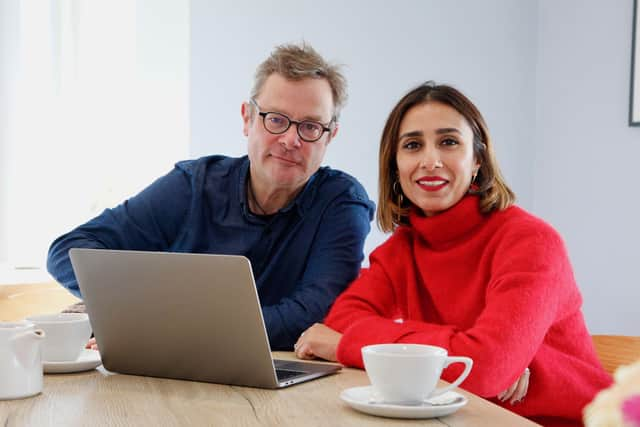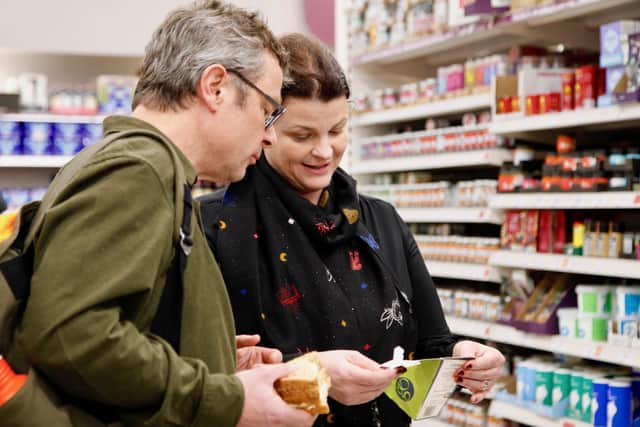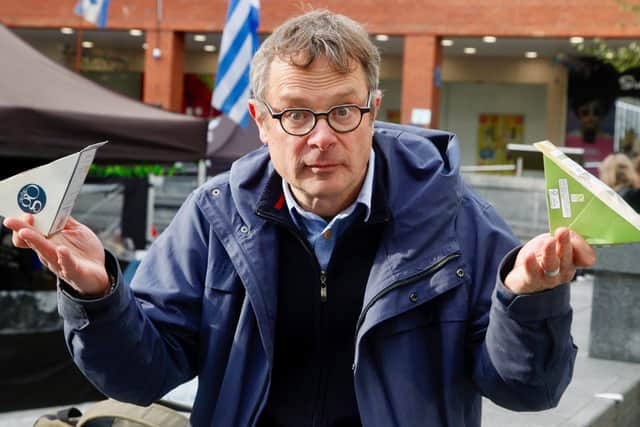Hugh-Fearnley Whittingstall and Anita Rani: Covid-19 and disposable masks are making world’s plastic pollution crisis worse
While tackling plastic waste may have gone on the back burner in recent months, for Hugh Fearnley-Whittingstall it most definitely hasn’t. In the mind of the celebrity chef and TV presenter, the coronavirus pandemic has made the problem even more acute.
Disposable masks are turning up in the oceans and shoppers have gone from decrying plastic-wrapped fruit and veg, to feeling they could be the safer option.
Advertisement
Hide AdAdvertisement
Hide AdThis new reality meant co-presenters Fearnley-Whittingstall and Bradford-born Anita Rani had to film new scenes for their BBC One show War On Plastic, after having officially finished. The show follows up their first programme on the same topic last year.


They look at the “disgusting” phenomenon of plastic in tea bags in the upcoming series and the recycling menace of ready-made sandwich cartons.
They also grill a McDonald’s bigwig – or rather some underwhelmed children take him to task – over the contribution made by Happy Meal toys to our plastic waste mountain.
Those scenes had all been “done and dusted” when the presenters found the pandemic meant there were new issues to tackle.
Advertisement
Hide AdAdvertisement
Hide Ad“We decided to go back and make some changes to the film,” says the chef, who shot to fame just over 20 years ago when he left London to try to become self-sufficient in the countryside.


“I recorded my voiceover for the film at the beginning of lockdown with my head in a cupboard at home. And it was good to go.
“And then, as the story of Covid went on, we thought, ‘No, this is affecting the plastic situation. We have to address this issue of masks and this understandable reflex that somehow, food wrapped in plastic is going to be safer’.
“But actually, it really isn’t,” he says.
In an interview with the BBC published at the weekend, Rani explained that the pandemic has contributed in a negative way to plastic pollution.


Advertisement
Hide AdAdvertisement
Hide Ad“The commonly used blue single-use surgical masks contain polypropylene, a type on non-recyclable plastic, and if every person in the UK was to wear one of these every day for a year, that would create about 128,000 tonnes of plastic waste,” she said.
“If not disposed of responsibly, they end up in landfill and our oceans.
“In the show I catch up with Professor Mark Miodownik, an expert in material science to find out more about the role of plastic in this pandemic.”
A scene in the series captures Rani’s horror when she watches, on film, an octopus emerge from underneath a disposable mask on the ocean floor.
Advertisement
Hide AdAdvertisement
Hide Ad“The idea that the world is filling up with millions or billions of disposable plastic masks, and they’re already in the sea, is just too grim for words,” Fearnley-Whittingstall says.
The series also follows a family who are desperate to cut down on their use of single-use plastic, without spending a fortune. They make homemade oat milk – it involves soaking, rinsing, blending and pouring the liquid through a sieve. It all looks way too time consuming to catch on, at least in my household.
“I agree that some things are a step too far for some people,” the former River Cottage star says.
However, he has made “no-brainer” changes in his own life – using a cloth shopping bag, a keep cup for takeaway coffee and a reusable water bottle. “That’s the entry-level stuff but it’s also really big stuff. It makes a massive difference,” he notes.
Advertisement
Hide AdAdvertisement
Hide AdAfter discovering his tea bags contained plastic – they “were turning up in the compost undecomposed” – he bought loose leaf before finding a plastic-free brand.
And “I recycle” them, he laughs.
“I make a Masala Chai by using the tea leaves second time round, with spices. You boil them up with a little bit of milk and some cardamom and ginger. You’ve got a second cup of tea free!”
But it’s not all down to us, he says – the Government must also do more.
He urges Ministers to make businesses and producers “of packaging pay for the effective recycling, or safe disposal of the plastics, rather than passing the problem on to consumers”.
Advertisement
Hide AdAdvertisement
Hide Ad“It’s never been fair that consumers and councils need to pick up the bill for the profligate and unnecessary use of single use and unrecyclable plastics by big business,” he says.
“That’s one of the problems with Covid. It’s given the Government an excuse to drag its heels on a number of fronts and dealing with the plastics issue seems to be one of them.”
With so much to be fired up about, I wonder how he relaxes – the answer, recently at least, has been discovering the flora near his bucolic home in Devon.
“One of the things I did was teach myself to identify wildflowers,” he says of lockdown.
Advertisement
Hide AdAdvertisement
Hide Ad“I found well over 150 wildflowers within a short walk of my front door, and that was amazing.
“Now, whenever I go for a walk, I’m learning all the time.
“I’m seeing things that I didn’t see before. And that’s something that I’ll carry with me.”
He is happiest outdoors – “being in the veg garden, walking the dogs, looking after the chickens and a bit of pond swimming”.
And he hopes that “everybody feels that the countryside is for them.
Advertisement
Hide AdAdvertisement
Hide Ad“That starts at school, taking kids out of school into the country to show them how to identify wild plants and trees,” he says.
If “you make this a part of kids’ lives and understanding, then they will nurture the world around them as they grow up”, the father of four adds.
“The bigger the human footprint on the planet, the more important it is that kids are engaged with these issues, from the very beginning of their education.”
Children have become increasingly impassioned about the environment – thanks partly to activist Greta Thunberg – and this fills him with “excitement and belief”.
Advertisement
Hide AdAdvertisement
Hide Ad“They’re the antidote to the sort of feeling that it’s all too hard, too difficult and too late,” he says.
“If you start to feel that you think, ‘Well, hang on a second, here comes a generation who recognise the problem, and are ready to take action themselves’. So that is brilliant.”
He adds: “Before (Covid), it felt like we were really motoring, really getting somewhere” on the issue of plastics. If it’s gone down the charts a little bit, it’s going to come back because if people start seeing masks turning up in the sea – that’s like Blue Planet II all over again.
“We know that upsets people. And it’s going to motivate public action.”
Rani hopes show can bring change
Advertisement
Hide AdAdvertisement
Hide AdAnita Rani says she hopes the new instalment of War on Plastic will be a reminder of the importance of preserving the world around us.
“It’s been a tough time for everyone, but now that we are getting into the rhythm of the new world we can remember the importance of sustainability,” she says.
“If once again we come together, we can make change happen. We need big businesses and government to make bold and important decisions to get single use plastic out of the system.”
Fearnely-Whittingstall adds: “Perhaps I’m being too optimistic, but wouldn’t it be great if programmes like these got people to think differently about how we live in the future?”
Advertisement
Hide AdAdvertisement
Hide AdWar On Plastic: The Fight Goes On airs at 9pm on BBC One on Tuesday, September 1.
Support The Yorkshire Post and become a subscriber today.
Your subscription will help us to continue to bring quality news to the people of Yorkshire. In return, you’ll see fewer ads on site, get free access to our app and receive exclusive members-only offers.
So, please - if you can - pay for our work. Just £5 per month is the starting point. If you think that which we are trying to achieve is worth more, you can pay us what you think we are worth. By doing so, you will be investing in something that is becoming increasingly rare. Independent journalism that cares less about right and left and more about right and wrong. Journalism you can trust.
Thank you
James Mitchinson
Comment Guidelines
National World encourages reader discussion on our stories. User feedback, insights and back-and-forth exchanges add a rich layer of context to reporting. Please review our Community Guidelines before commenting.